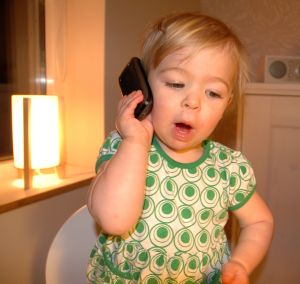Writing is all about babbling on the page. Really.
This notion changed the way I write. In order to access my natural writer, I have to approach the writing process in the same way a baby approaches learning a new language. Since I’m around children a lot, this concept was a lightbulb moment for me.
My children didn’t start off speaking the King’s English, and as a mom, I didn’t expect them to do so. Yet when it came to writing, I was super-hard on myself. I wanted to write perfectly from the start. Writing this way is contrary to becoming a natural writer. My formal education had a lot to do with this. How many of us wrote papers, handed them over to the English teacher, and received our papers doused with red ink?
When my children were babies, they gurgled and cooed all day, and I never put them in time out for incomprehensible speech. Instead, I cheered them on. After receiving my encouragement, they grinned and “goo-gooed” even more. As writers, we need to turn off that internal editor and “goo-goo” on the page. Now when I sit down to write, I make a conscious effort to be a child again. If I don’t, perfectionism will paralyze me and, quite frankly, perfect sucks. So what principles can we take from how children acquire language that are similar to accessing our natural writer?
Children learn language by first hearing language. Likewise, natural writers read a lot of writing to get a feel for how language works.
With my busy lifestyle, it can be a challenge for me to carve out time to read, but I try to set aside a couple of evenings a week. Reading widely keeps me from getting lost in my own head. It exposes me to different literary voices and styles. Each story I read sharpens my literary ear and helps me become a more natural writer.
Babies gurgle and coo a lot. In a similar respect, natural writers gurgle and coo by free writing.
Once I got rid of the notion that I had to be the “most perfectest writer that ever lived” (ha!), I wrote a whole lot more and I wrote a whole lot faster. Ideas for scenes abounded; article ideas flowed. After turning off that internal critic, I enjoyed writing. Early morning free writing quickly squelches the internal critic. Julia Cameron calls this free writing, “Morning Pages.” She describes it as three pages written in longhand. Those pages can be about anything. In her book “The Artist’s Way,” she says Morning Pages are a vacuum cleaner for your brain. They clear out the gunk so you can think clearly.
So there you have it. By reading a lot and free writing a lot, you’ll access your natural writer. Ba-da bing. Ba-da boom. Next Monday, I’ll discuss my process for generating ideas quickly.
What about you? Have you had a desire to write but felt stymied by perfectionism?

I love this way of looking at writing! Sometes I find when I’m not trying so hard is when the best ideas get on the page.
I agree Ariel. I also get the best ideas when I’m not trying so hard. Ironic, huh?
“Babbling on the page”–what a great way to put it! Thanks for the reminder of the importance (and childlike joy) of free writing.
You’re welcome, Stephanie. I’m glad you enjoyed it!
I love how you explained it. I also read Julia Cameron. I read “The Writing Diet” which has the same ‘morning pages’ advice in it. I started morning pages about a year and a half ago and now I’m addicted. I should probably say it’s become my habit now. Gradually I’m finding my voice and learning to be brave. Thank you for this way of explaining it.
You’re welcome, Hanna! I’m glad it helped 🙂